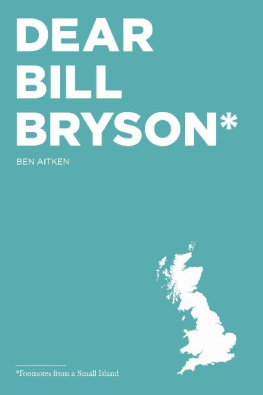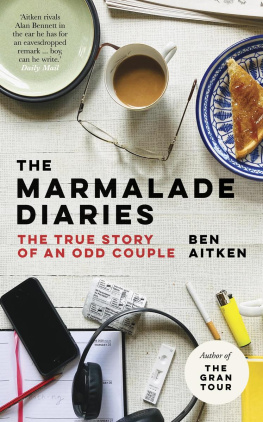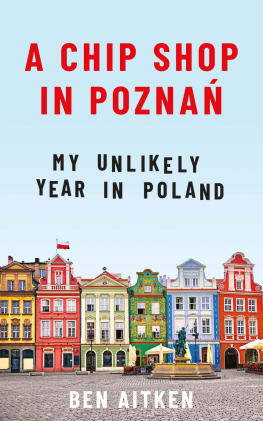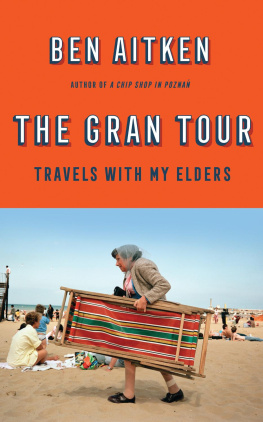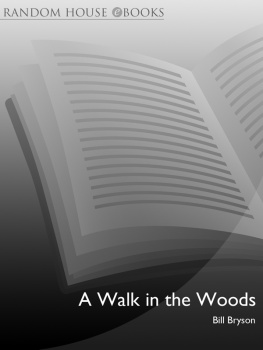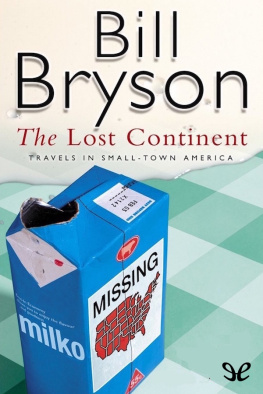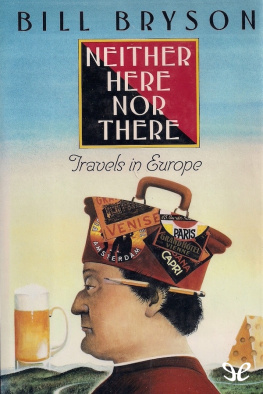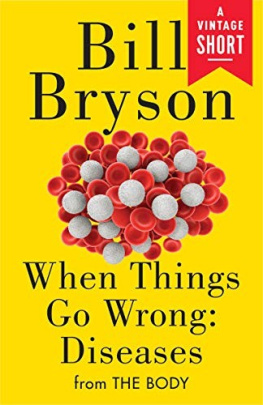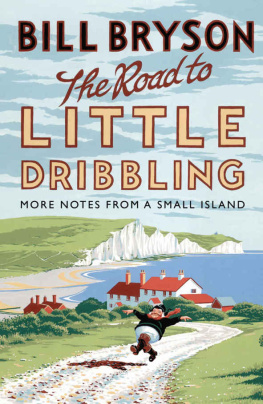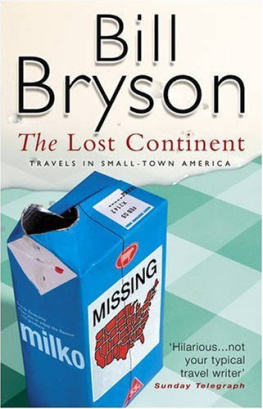Ben Aitken - Dear Bill Bryson: Footnotes from a Small Island
Here you can read online Ben Aitken - Dear Bill Bryson: Footnotes from a Small Island full text of the book (entire story) in english for free. Download pdf and epub, get meaning, cover and reviews about this ebook. year: 2015, genre: Detective and thriller. Description of the work, (preface) as well as reviews are available. Best literature library LitArk.com created for fans of good reading and offers a wide selection of genres:
Romance novel
Science fiction
Adventure
Detective
Science
History
Home and family
Prose
Art
Politics
Computer
Non-fiction
Religion
Business
Children
Humor
Choose a favorite category and find really read worthwhile books. Enjoy immersion in the world of imagination, feel the emotions of the characters or learn something new for yourself, make an fascinating discovery.
- Book:Dear Bill Bryson: Footnotes from a Small Island
- Author:
- Genre:
- Year:2015
- Rating:3 / 5
- Favourites:Add to favourites
- Your mark:
- 60
- 1
- 2
- 3
- 4
- 5
Dear Bill Bryson: Footnotes from a Small Island: summary, description and annotation
We offer to read an annotation, description, summary or preface (depends on what the author of the book "Dear Bill Bryson: Footnotes from a Small Island" wrote himself). If you haven't found the necessary information about the book — write in the comments, we will try to find it.
Dear Bill Bryson: Footnotes from a Small Island — read online for free the complete book (whole text) full work
Below is the text of the book, divided by pages. System saving the place of the last page read, allows you to conveniently read the book "Dear Bill Bryson: Footnotes from a Small Island" online for free, without having to search again every time where you left off. Put a bookmark, and you can go to the page where you finished reading at any time.
Font size:
Interval:
Bookmark:


Ben Aitken was born under Thatcher. He grew to 6ft then stopped, and is an Aquarius.
Also by the author:

For my grandparents.
CONTENTS

Dear Bill Bryson,
Ever since I was a kid I wanted to be a middle-aged American. Id go about school wearing white socks and a fanny-pack, mouthing off about taxes, telling anyone that would listen about my four-speed lawnmower. I used to tip the dinner-ladies 25% for Gods sake.
Why? Well, in a word you. I first saw you on television when I was about nine and should have been in bed. You were stood in some field, saying how nice it was. But it wasnt what you were saying but how you were saying it. I liked your voice, Bill. You sounded so, I dont know, understanding, as if youd agree to any reasonable proposition Say, Bill, mind if I chuck an egg at you? Well, Im mowing the lawn right now, Ben, but how does three oclock sound? I asked my Mum if we could get you over for a few babysitting shifts. She told me to turn that crap off and get to bed.
To be honest, I forgot about you after that. Then I found your book one day, the one inspired by the field, the one you wrote twenty years ago before going back to the States, the one that was a best-seller in charity shops all over Europe.
Long story short, Ive decided to retrace your steps. Why? Because Im bored. Take it from me, theres only so many tacos a guy can serve before he wants to put a pint of salsa down his windpipe.
First stop, Calais. You remember this town, Bill? Youve little reason to, I suppose, since you did bugger all here. And the things you did do well, I cant even be sure you did those either. For example, you say you took a coffee on the Rue de Gaston Papin, but when I asked a local shopkeeper where I might find such a road, she answered with a look that suggested both xenophobia and pity, before telling me that such a road almost certainly doesnt exist, on account of Rue de Gaston Papin meaning Road of the Forgetful Squid, or something equally unlikely.
Ive got to say, Bill, I was pretty wound-up. I slammed my copy of Notes from a Small Island against the counter; withdrew my babysitting offer; poked the shopkeeper in the eye. I mean, if you were fibbing about Gaston Papin, what else were you fibbing about? Does Milton Keynes even exist?
Disheartened, I asked a passing clergyman how to get back to the ferry terminal. He issued a volley of eloquent,
and no doubt instructive, French words, which I pretended to understand perfectly, when, in fact, I understood nothing at all.
I reasoned that the ferry terminal must be near the water, and so headed for the beach, where I found a teenager chain-smoking electronic cigarettes and whispering philosophical maxims to a point in the middle distance. I pointed to the bundle of cranes and freight containers yonder and said, skilfully, and in French, Boat? He shrugged six times and then quoted Jean-Jacques Rousseau, who once said, or so Im led to believe, In autumn there is hope, which I understood to mean that he wasnt at all sure.
I found the ferry without further ado and took up vigil on the smoking deck. The day was bidding adieu, and as the coconut cliffs of Dover began to draw up from the Channels dark soup (overwritten?), I reasoned that things werent so bad after all to be on these waves and under this sky and at the dawn of what promised to be an eventful, if unoriginal, journey around a small island. (Whats the deal with copyright, by the way?)
Yours,
Ben

There wasnt really a young man quoting Rousseau; there was no passing clergyman; I did not poke a woman in the eye. I made those things up to get your attention, which is what youre supposed to do at the start of a book. Youre also supposed to start with a description of the weather, so I should add that, for the most part, it was overcast in Calais. I also suggested that the reason I chose to retrace Brysons journey was because I was bored. Again, not true. The truth is that by copying Bryson I felt my writing might attract more than seven readers.
I was only in Calais for two hours. It should have been six, but I had missed my train at London Bridge that morning, having accepted a second bowl of porridge at a flat in Stockwell, causing me to miss my ferry crossing at Dover. I eventually took a delayed early-evening service, on which nothing much happened, though I might have sent a text message to a Spanish girl who told me two months earlier not to fall in love with her.
I walked into Calaiss centre along the Rue Constant Dupont and the Rue Pierre Mullard street names that seemed elegant and thrilling, despite their essential banality. I passed a pub called Le Liverpool, which looked sad and unpopular. I suppose it was once busy with British day-trippers in shell-suits stocking-up on Kronenbourg and Cte du Rhne, the sort of people Bryson records seeing a lot of in 94. I wondered about the provenance of this pub. Perhaps, in the late 80s, a canny Frenchman thought hed cash-in by giving the day-trippers a slice of home, understanding that the British tend to go overseas not to escape their culture but to find a warmer or cheaper version of it.
I came to the Place dArmes, where I made a cursory effort to find a Virgin Mary bedside lamp. (Bryson bought one here, you see, before spending the evening playing with it in his hotel room.) I took a walk up to the old town to see the Rodin sculpture. The Burghers of Calais depicts half-a-dozen members of the citys medieval middle-class looking fed-up, on account of the King of England having just announced that they were to be executed the following Tuesday. The burghers were eventually pardoned after the Kings better-half intervened. Rodin has a lesser known sculpture, round the back of the hotel, of the men looking relieved.
I took the plat du jour at Au Bureau on the Rue Royal and drank two bottles of Stella Artois and it felt good and warm to be alone and softly drunk, having not eaten since the second bowl of porridge ten hours earlier. I enjoyed the strange anonymity of being foreign, when one is at once more and less obvious to others, more and less significant. I knew no one in this city; I had no appointments or obligations; I had never cried or laughed or made mistakes here. For all anyone knew, I might have been arrogant or timid or generous or sad. As I reflected on the cleansing effect of travel that I was once again at the beginning of my character the beef stew arrived.
Walking back to the ferry terminal, I thought about concrete. That Calais is mostly concrete is partly Britains fault. The city was bombed heavily by the Germans in 1940. Almost the whole town was levelled. What remained was then bombed by the British, who mistook Calais for Dunkirk, where there was still a German presence. It is easy to dislike concrete structures because they are so often featureless. (I mean, how many featureless people are you attracted to?) But when one is faced with the task of rebuilding a city, as the city fathers of Calais were, is it not right to approach that task with cost and speed at the forefront of ones thinking? Should those displaced by the bombing have been put into a tented village for sixteen years while a neoclassical wonderland was expensively and painstakingly assembled? If it was concrete that returned the people of Calais to their homes, schools, and workplaces more quickly and more affordably, then I salute it, no matter its ugliness. Solutions often lack beauty.
Next pageFont size:
Interval:
Bookmark:
Similar books «Dear Bill Bryson: Footnotes from a Small Island»
Look at similar books to Dear Bill Bryson: Footnotes from a Small Island. We have selected literature similar in name and meaning in the hope of providing readers with more options to find new, interesting, not yet read works.
Discussion, reviews of the book Dear Bill Bryson: Footnotes from a Small Island and just readers' own opinions. Leave your comments, write what you think about the work, its meaning or the main characters. Specify what exactly you liked and what you didn't like, and why you think so.

